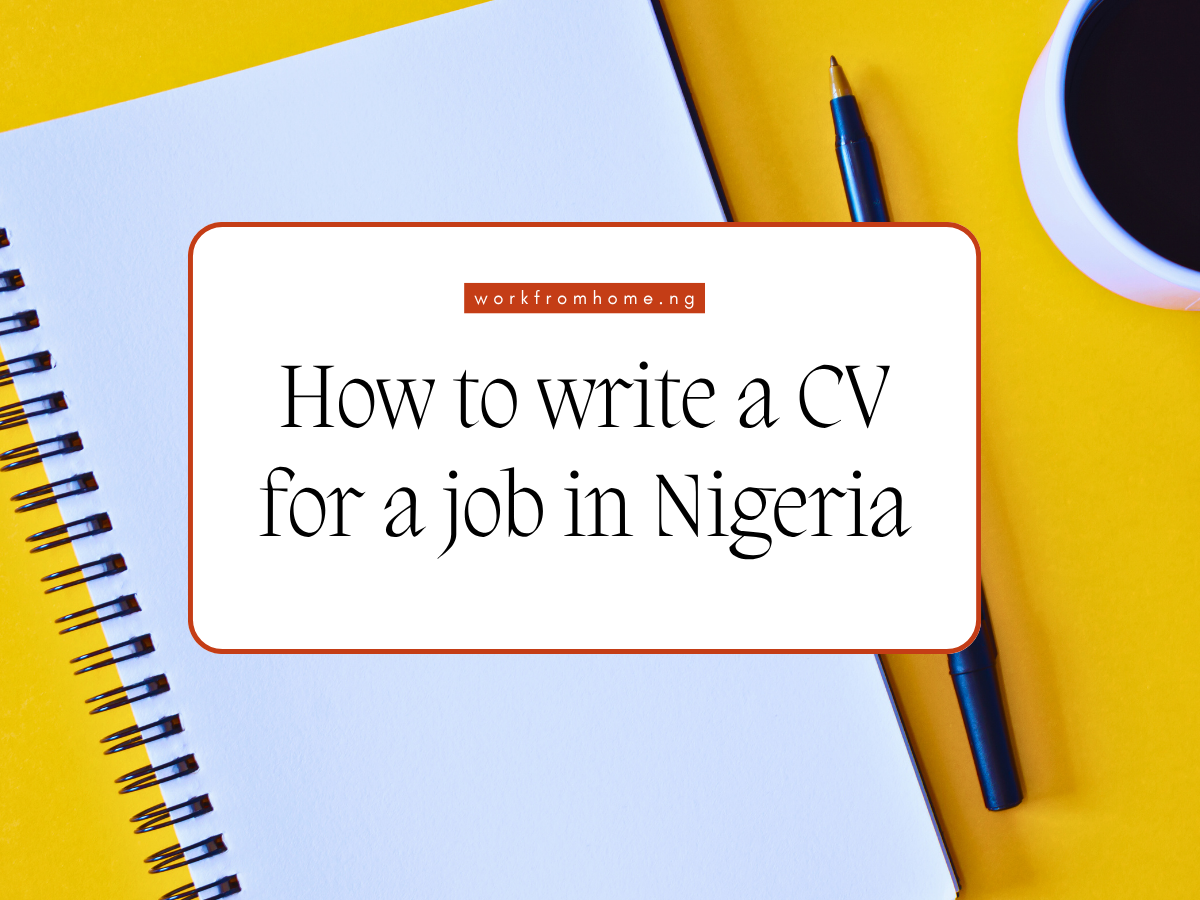
Think of how many jobs you’ve applied for and how many of them gave you a callback. In Nigeria, your CV is often the make-or-break factor. Most times, it’s not because you’re unqualified, it’s because your CV didn’t represent you well enough. Your CV is your first impression before a potential recruiter meets you. In Nigeria’s competitive job market, that first impression can make or break your chances of an interview. CV writing is your meal ticket to landing an interview. Well, except you want to follow the “man know man” route (Nigerian slang for a favor gotten through connections). Whether you’re a fresh graduate, an entry-level professional, or someone seeking better opportunities, learning how to write a CV that stands out can be the difference between being overlooked and being invited for an interview. Nigerian employers aren’t just looking for graduates and certificates anymore, they’re looking for clarity, relevance, and results.
What Recruiters Look Out For in a CV
Most recruiters don’t have the luxury of time to read CVs word for word, they scan. In those few seconds, they’re looking for reasons to either keep reading or move on to the next applicant. Understanding what recruiters look for in a CV in Nigeria helps you write a document that grabs attention and earns you an interview invite. When writing your CV, pay attention to the following:
1. Clear Presentation
The first thing a recruiter notices is how your CV looks. A clean layout, simple fonts, and well-organized sections immediately show that you pay attention to detail. Avoid fancy designs or colors that make your CV hard to read. Keep it neat, easy to scan, and properly formatted for both print and online submission. Use standard fonts like Arial or Calibri, and keep your CV length within one to two pages.
2. A Strong Career Summary
One of the ways to pitch your skill in CV writing is the description in your professional summary. It should be a short paragraph that describes your expertise. See this as your elevator pitch. Recruiters read it first, and it determines if they’ll keep going. It should summarize your experience, key skills, and the value you bring, all in 3–4 lines. Example: “Results-driven administrative professional with 3 years of experience managing client communication, scheduling, and data reporting. Skilled in Microsoft Office and Google Workspace. Passionate about efficiency and accuracy in daily operations.”
3. Relevant Work Experience
Recruiters are more interested in the results you’ve achieved than in a list of your job duties. Recruiters love to see proof that you can deliver results. Quantify your work wherever possible, it gives weight to your claims. They want to see the value you can bring to their organization. In your professional experience section, focus on your achievements and the impact you made in previous roles. Instead of writing vague responsibilities, use bullet points that highlight measurable outcomes. Example: Instead of saying “Handled customer complaints,” write “Resolved 50+ customer issues weekly, improving client satisfaction by 25%.”
4. Skills That Match the Job Description
Your skills section is where recruiters quickly match your abilities with the job requirements. Tailor this part for every role. If the job description mentions “Microsoft Excel” or “Social Media Management,” make sure those keywords appear naturally in your CV. Balance hard skills (Excel, Canva, email marketing) with soft skills (communication, teamwork, problem-solving).
5. Core Competencies or Key Skills
This section gives recruiters a quick snapshot of what you’re really good at. Think of it as your skills highlight, short, clear, and keyword-rich. Keep your core competencies relevant to the kind of job you’re applying for. If you’re applying for a marketing or project role, highlight management, communication, and digital tools. If it’s an admin or support role, emphasize organization, documentation, and customer relations.
6. Education Details
Your education section tells recruiters where your learning journey started, but it should be short, neat, and relevant. If you’re a fresh graduate, put your education at the top of your CV since it’s your strongest selling point right now. But if you’re already an experienced professional, move it down below your work experience. If you graduated with honors or completed a relevant final-year project, you can mention it briefly.
Example: University of Lagos, Lagos State
B.Sc. Business Administration | 2022
READ MORE: How to Nail Your Remote Interview: Tips and Strategies for Success
10 Things You Should Never Include in a CV
- Personal Details (Age, Marital Status, Religion, or Full Home Address)
- Unprofessional Email Addresses (Emails like sweetgirl996@ or badtguy4life@ instantly kill professionalism)
- Irrelevant Work Experience that has nothing to do with the job you’re applying for.
- Fancy Fonts and Graphics. They can make your CV unreadable when submitted.
- Negative Language or Complaints About Past Jobs.
- Salary Expectations. Discuss compensation only when it’s requested during the interview process.
- References on the CV. “References available on request” is enough.
- Unnecessary Personal Interests (e.g hobbies).
- Unverified Achievements or False Information can ruin your reputation long-term.
- Sending Your CV in the Wrong Format (as Word documents instead of PDFs).
Interested in How to Get a Job in Nigeria Without Experience?
If you’re a fresh graduate or someone looking to switch careers, don’t panic if you have little or no experience. Because there are opportunities waiting for you, especially in remote and digital roles. Check out our guide on Top Remote Jobs You Can Get With Zero Experience to see the easiest roles to start with, even if you’re new to the job market.
Conclusion
Learning how to write a CV in Nigeria that clearly shows your skills, achievements, and value is one of the smartest moves any job seeker can make. A professional CV doesn’t need fancy graphics, it needs clarity, relevance, and results. When recruiters open it, they should instantly see who you are, what you’ve done, and why you’re the right fit. Your next job opportunity might just be one updated CV away.


